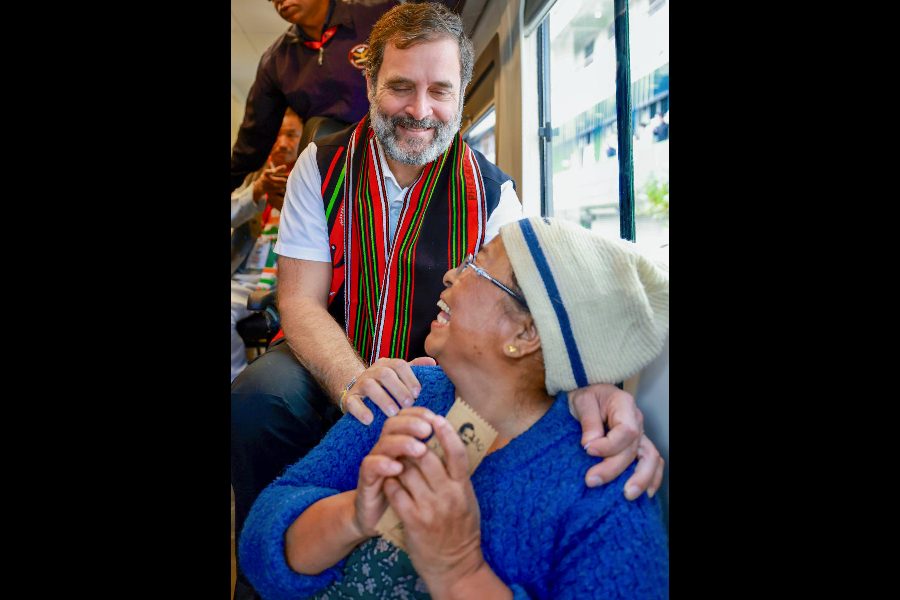“Humanity is sad today — it has lost its devotee. Peace is restless today — its protector is no more.”
This is what Atal Bihari Vajpayee said on the death of Jawaharlal Nehru, who and his family were called anti-Hindu and anti-Ram by the Sangh Parivar for generations.
While Nehru was a self-proclaimed atheist, Indira Gandhi and Rajiv Gandhi had unwavering faith in religion. Rahul Gandhi, a devotee of Lord Shiva, is deeply religious. But he is truly secular, believing in the constitutional principle of equality, and respects all religions.
Many BJP spokespersons have been describing the Nehru-Gandhi family as anti-Hindu. Although the chorus has intensified after the Congress's rejection of the invitation for the January 22 ceremony in Ayodhya, with a section of the media lapping up the slander, political observers who know the family describe the charge as preposterous.
Even Sonia Gandhi, who is a Christian by birth, has willingly embraced Hindu customs and publicly demonstrated her respect for all religions.
While Sonia has worshipped in the most important temples in India and even taken a holy dip during the Kumbh, Rahul’s profound interest in religion and devotion to Lord Shiva is known to all. Although his 12-day pilgrimage to Kailash Mansarovar in September 2018 — without any political fanfare — drew national attention, what cemented the public perception about his genuine religiosity was the “sewa” he quietly offered at the Kedarnath and Golden Temple last year.
Congress leaders say that Rahul often confronts intellectuals and even seers with philosophical questions on religion and scriptures and the rigidity and determination that helped him complete the Kanyakumari-to-Kashmir walk that was born out of a spiritual quest rather than any political plot. “Ram symbolised justice and Rahul’s Nyay Yatra is dedicated to securing justice for every citizen. He is traversing the path shown by Ram,” one of his aides said.
Asked about the Sangh Parivar propaganda of his family being anti-Hindu, Rahul said on Tuesday: “I think those who are faithful maintain a personal relationship with religion. They use religion to shape their lives. People who publicly demonstrate their religiosity, who wear religion on their chest, are trying to exploit religion for benefits. I don’t use my religion for political gains. Not interested. But I follow the principles of religion in leading my life.”
He added: “I behave with people with humility, respect them, don’t show arrogance when somebody approaches me. I don’t spread hate. That’s Hinduism for me. I follow it in my life. But I don’t have to advertise it on my shirt. Those who don’t believe in religious principles need to advertise it.”
Rahul has clearly chosen a different path from Nehru who never went to temples or worshipped any God. Nehru always appreciated Mahatma Gandhi’s emphasis on the ethical and moral aspects of religion even as he wrote in his autobiography: “The spectacle of what is called religion, or at any rate organised religion, in India and elsewhere has filled me with horror, and I have frequently condemned it and wished to make a clean sweep of it. Almost always it seems to stand for blind belief and reaction, dogma and bigotry, superstition and exploitation, and the preservation of vested interests.”
But he added, demonstrating his liberal approach and deep understanding of the philosophical content of spirituality: “And yet I knew well that there was something else in it, something which supplied a deep inner craving of human beings. How else could it have been the tremendous power it has been and brought peace and comfort to innumerable tortured souls?”
But Nehru firmly believed that governance should strictly be done on the basis of political principles, not through religious interests. He tirelessly worked to execute his vision of creating a modern national consciousness that was not dominatedby religious and cultural sentiments. Rahul symbolises similar politicalcommitments even as he is religious at the personal level.
But the Nehruvian model, under attack on various aspects, is being dismantled in the context of the State’s relationship with religion. The walls are not being demolished for a deeper involvement of the State in the matters of all religions; there is a clear alignment of the State with the Hindu religion which tramples the principle of not only neutrality but also equality.
Will Prime Minister Narendra Modi play the same pivotal role in the issue of Islam or Christianity? The Uttar Pradesh government has issued a notification to all the district authorities and village sarpanch, directing them to hold Ram bhajans and prayers in every village from January 14 to January 22. This will involve a huge cost. Will the State, which cracks down on Muslims for offering namaz in public places, engage with the devotees of other religions in this manner? The questions are being asked by political observers who are rattled by this metamorphosis of the Indian State.
The Indian State that was designed by the first Prime Minister about whom Vajpayee wrote: “Humanity is sad today. It has lost its devotee.”










